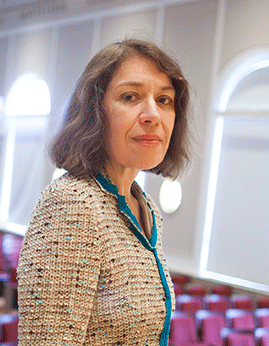非常抱歉,
你要访问的页面不存在,
非常抱歉,
你要访问的页面不存在,
非常抱歉,
你要访问的页面不存在,
验证码:

职称:Paul and Catherine Buttenwieser University Professor
所属学校:Harvard University
所属院系:music
所属专业:Music, General
联系方式:617-496-6527
Abbate received a B.A from Yale and a Ph.D. from Princeton; she has taught at Princeton and the University of Pennsylvania and (as visiting faculty) at the Freie Universität Berlin; and held research fellowships and lectureships at the Wissenschaftskolleg Berlin, Kings College Cambridge, the University of Hong Kong, and the Institute for Advanced Study Princeton. Outside academia, she has worked as a dramaturg and director. Many of her writings focus on opera, from its beginnings around 1600 through the 21st century. She has also published essays on musical automata from Mozart to Ravel; film scores in the 1930s; musical hermeneutics; the ethics of overlooking the ephemeral; Wagner and the soundtrack. Her latest book, co-authored with Roger Parker, is A History of Opera: The Last Four Hundred Years (2012). She has served on many professional and editorial boards, and fellowship panels, and is currently on the editorial boards for Musik und Aesthetik and The Opera Quarterly. In 2014, she was named a University Professor, Harvard’s highest honor for a faculty member, by President Drew Faust. Abbate’s research crosses many disciplines. She is interested in how material objects and embodiment fascinate historians, and how they are used and misused in arguments about music history. Her article “Music – Drastic or Gnostic?” (2004), one of the most-cited essays in contemporary musicology, reflects ongoing skepticism about the ways in which music is made to speak interpretive or cultural truths. Her work has integrated thinking from philosophy and aesthetics, linguistics, and history of technology. Her interest in moral philosophy and music (as embodied in Kracauer and Jankélévitch) has emerged in her historical work on operetta film and the value of frivolity in Germany ca. 1920-1933. Her current research on early sound film deals with issues that range from our knowledge of the human sensorium and listening in past eras, to the artisanal practices of supplying music in film exhibition through the 1920s, and how alternative, vernacular philosophies of musical meaning, of sound as flowing from animated objects, grew from this transitional moment in Europe and America.
Abbate received a B.A from Yale and a Ph.D. from Princeton; she has taught at Princeton and the University of Pennsylvania and (as visiting faculty) at the Freie Universität Berlin; and held research fellowships and lectureships at the Wissenschaftskolleg Berlin, Kings College Cambridge, the University of Hong Kong, and the Institute for Advanced Study Princeton. Outside academia, she has worked as a dramaturg and director. Many of her writings focus on opera, from its beginnings around 1600 through the 21st century. She has also published essays on musical automata from Mozart to Ravel; film scores in the 1930s; musical hermeneutics; the ethics of overlooking the ephemeral; Wagner and the soundtrack. Her latest book, co-authored with Roger Parker, is A History of Opera: The Last Four Hundred Years (2012). She has served on many professional and editorial boards, and fellowship panels, and is currently on the editorial boards for Musik und Aesthetik and The Opera Quarterly. In 2014, she was named a University Professor, Harvard’s highest honor for a faculty member, by President Drew Faust. Abbate’s research crosses many disciplines. She is interested in how material objects and embodiment fascinate historians, and how they are used and misused in arguments about music history. Her article “Music – Drastic or Gnostic?” (2004), one of the most-cited essays in contemporary musicology, reflects ongoing skepticism about the ways in which music is made to speak interpretive or cultural truths. Her work has integrated thinking from philosophy and aesthetics, linguistics, and history of technology. Her interest in moral philosophy and music (as embodied in Kracauer and Jankélévitch) has emerged in her historical work on operetta film and the value of frivolity in Germany ca. 1920-1933. Her current research on early sound film deals with issues that range from our knowledge of the human sensorium and listening in past eras, to the artisanal practices of supplying music in film exhibition through the 1920s, and how alternative, vernacular philosophies of musical meaning, of sound as flowing from animated objects, grew from this transitional moment in Europe and America.